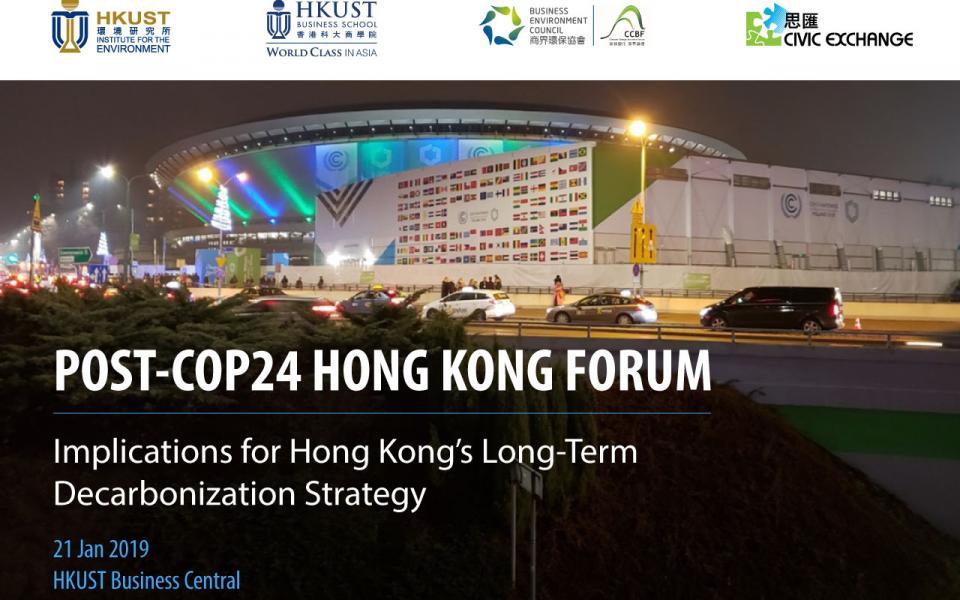Event Background
Two decisions in the 2015 Paris Agreement made COP24 special:
1. Asking the Intergovernmental Panel on Climate Change (IPCC) to report by COP24 on the benefit of keeping temperature increases to 1.5°C rather than the previous objective of 2°C. Secondly on how this can be done. The IPCC has reported that:
- The climate system is more sensitive than previously thought and there are very significant benefits from keeping global average temperature increase to 1.5°C rather than 2°C.
- Keeping temperature increase to 1.5°C is geo-physically possible but requires rapid action to reach carbon neutrality by 2050.
2. Tasking COP24 with finishing the ‘Paris Rulebook’: The Paris Agreement used constructive ambiguity to allow countries with different views to sign up. Agreeing the Rulebook required eliminating these ambiguities. Contrary to expectations, COP24 succeeded in agreeing rules on reporting of emissions, stock-takes on progress in mitigation, adaptation, financial flows, addressing loss and damage, and boosting the ambition of Nationally Determined Contributions (NDCs). The only significant area it had to postpone until next year was agreeing rules on international carbon trading (Article 6).
Event Highlights
Governments’ actions following COP24:
- How will implementing the Paris Rulebook affect China and Hong Kong?
- What will be done to raise ambition on reducing carbon emissions given the IPCC’s 1.5°C report?
- The Paris Rulebook provides a ‘common playing field’ for ratchetting up NDCs.
- The 2018 Talanoadialogues’ objective was to raise ambition for ratchetting up NDCs.
- The Paris Agreement calls for NDCs to be revised at COP26 in 2020. Key events prior to that are the UN Secretary General’s September 2019 summit in New York and COP25 in Chile.
- China’s action including its national carbon trading scheme for electricity generation.
- The Silesian Declaration on Just Transition.
Private sector action to decarbonize Hong Kong given the IPCC’s advice that global carbon-neutrality is needed by 2050 to keep global average temperature increase to 1.5°C:
- How can engineering our city and buildings reduce Hong Kong carbon emissions?
- How will Hong Kong, as a financial services center, play a role in the investment needed regionally to create a low-carbon, climate-resilient economy?
- How can Hong Kong move to zero carbon electricity by 2050?
- How will the Hong Kong’s Council for Sustainable Development’s public consultation gather views on Hong Kong’s long-term decarbonization?’
Click following links to watch video replays:
- Opening remarks by Mr. Robert Gibson [video]
- A view from Beijing by Prof. Ye Qi [video]
-
A European view by Ms. Vicky Pollard [video]
-
Hong Kong perspective by Dr. Agnes Wong [video]
-
Panel 1 discussed with topic of "Progress at Katowice of the Paris Agreement", moderated by Mr. Robert Gibson [video]
-
Engineering HK to a low carbon, smart & resilient city by Dr. Bruce Chong [video]
-
Financing action on climate change by Mr. Jonathan Drew [video]
-
How Hong Kong can obtain carbon neutral electricity by EurIng. Henry Wang [video]
-
Hong Kong’s Long-term decarbonization strategy by Prof. Lam Chiu-ying [video]
-
Panel 2 discussed with topic of "What pointers does COP24 give the private sector on action to decarbonising Hong Kong?, moderated by Mr. Simon Ng [video]
-
Closing remarks by Mr. Simon Ng [video]
Reference Materials:
